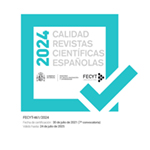Innovation and Byzantine Alchemy in Context: The Constantinian Solidus and the Chrysopoetic Goal
Resumen
El concepto de innovación no ha sido explorado a fondo en el contexto de la ciencia bizantina, y mucho menos en lo que respecta a la alquimia bizantina. Este artículo sostiene que los persistentes sesgos historiográficos que describen a Bizancio como una cultura estancada también influyen en las percepciones de la ciencia bizantina como antiinnovadora. Aprovechando los avances recientes en el estudio de la innovación en la cultura bizantina, este artículo comienza con un examen preliminar de la relación entre ciencia e innovación en Bizancio, revelando dinámicas intrigantes entre los conceptos de “tradición” e “innovación”. A continuación, investiga un estudio de caso de innovación en la alquimia bizantina, concretamente cómo una innovación monetaria y económica, la introducción del solidus por Constantino el Grande, probablemente influyó en la percepción de la alquimia como un arte principalmente crisopoético. En esencia, explora cómo una innovación externa puede impactar en un campo científico, conduciendo potencialmente a concepciones innovadoras y cambios dentro de él.











